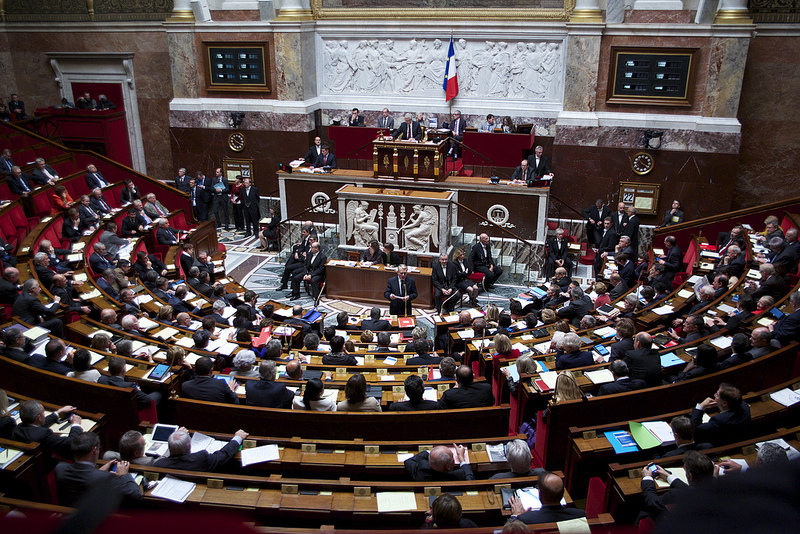Both houses of the French Parliament last week adopted resolutions opposing the investment protection rules in the proposed Canada-EU Comprehensive Economic and Trade Agreement (CETA), in the latest sign of growing opposition in Europe to the deal’s sweeping corporate rights provisions.
The National Assembly was first, adopting a resolution on November 23 which in part states that the National Assembly “opposes any mechanism for arbitration of disputes between states and investors and therefore requests the substantial revision of Chapters 10 and 33 on the protection of investments” (translated from the original French, emphasis added). Chapter 10 is CETA’s investment chapter, which includes the controversial investor-state dispute settlement mechanism (ISDS), which like NAFTA’s Chapter 11 allows corporations to directly sue states for measures they feel interfere with their “right” to profit. Chapter 33 outlines CETA’s dispute resolution process.
The call for “substantial revision” to these chapters would seem to suggest that the small changes which European Trade Commissioner Cecilia Malmstrom suggested could be made to ISDS during the legal scrubbing phase in order to placate German concerns over ISDS would not be enough to satisfy French parliamentarians.
The lower house’s resolution also reinforced its belief that CETA should be considered a mixed agreement, which would require ratification by the national parliaments of each of the EU’s 28 member states, in addition to approval by the European Council and European Parliament. While member states have long insisted that CETA is a mixed agreement, the European Commission is putting the question to the European Court of Justice regarding the EU-Singapore agreement, which contains similar investment provisions. The court’s decision could take as long as a year, and may put the Commission on a jurisdictional collision course with member states.
The resolution also reflects French concerns about CETA eroding Europe’s robust health and safety standards, calling for the precautionary principle to be fully protected from the agreement and objecting to CETA’s provisions on regulations related to genetically modified organisms (GMOs).
Four days later, the French Senate also adopted a text on CETA, calling on greater transparency and the involvement of both houses of the French Parliament, as well as expressing opposition to CETA’s investment protection, calling on the government to “ensure that the legal right of States to regulate can not be limited even in the name of ‘legitimate expectations’ of investors,” and if this is not possible that “it would be better to abandon the section on investment protection in the global agreement negotiated with Canada” in favour of a state-to-state dispute resolution process (all quotes translated from the original French).
While the resolutions are not binding on the French government, they reflect significant opposition of French parliamentarians to the controversial elements of CETA, especially to the deal’s investment protection rules, and send a strong message about the forthcoming ratification process.
Similar concerns have been expressed by Germany, although German Minister of Economic Affairs Sigmar Gabriel has recently backtracked on his opposition to ISDS, despite his own Social Democratic Party’s position in opposition to ISDS. The Austrian parliament adopted a similar resolution on September 24, which called into question the need for ISDS in an agreement between countries with developed legal systems.
In addition to the opposition to elements of CETA amongst parliamentarians, opposition to investor rights deals amonst the European public continues to grow. Despite the rejection by the European Commission of a formal European Citizens Initiative (ECI) on CETA and TTIP — a similar agreement being negotiated between the EU and U.S. — campaigners are just a few thousand signatures short of collecting one million signatures in the self-organized initiative in opposition to the trans-Atlantic deals. The coalition behind the effort is also challenging the decision to invalidate the formal initiative at the European Court of Justice.
While the Harper government has made every effort to sell CETA as a done deal, the reality is that given the widespread opposition in Europe its ratification is all but certain. Legal scrubbing, translation, and the decision by the European Court of Justice is a mixed agreement or not seem likely to push the ratification phase past next October’s Canadian federal election, and perhaps into 2016. Even is CETA makes it through the European Parliament — which is anything but certain — it could then face two years or more of ratification at the European member state level.
With mounting evidence about the risks CETA poses to public policy on both sides of the Atlantic, it’s far past the time for Canadians to finally have a debate similar to the one that is happening in Europe. With at least a year to go before ratification can begin, and with indications from Europe that modifications to the text will be required, now is the time for a debate at the federal, provincial, and local levels about CETA and whether or not it’s a good deal for Canada. It’s a debate that 80 per cent of Canadians across all party lines have said they want.
Unfortunately, rather than engaging with Canadians about CETA, the Harper government is instead putting out insultingly simplistic cartoons about the deal.
Just like in Europe, it’s time for a real debate about CETA in Canada.
If you agree, let the Harper government, federal opposition parties and your provincial government know that you want to see a real debate on CETA before it’s signed. You can also contact your municipal councillors and ask them what they’re doing to ensure the demands of more than 50 municipalities to be left out of the deal are fully reflected in the final agreement.




